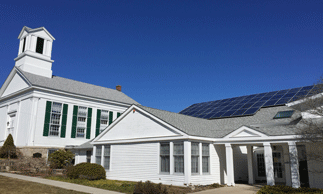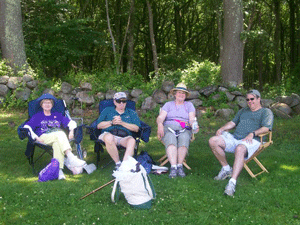We recently had the Columbus Day holiday. Most of us got a day off from work – and who doesn’t like that? But in recent decades there have been some complaints about this holiday: that Columbus’ explorations led to an invasion of the New World by Europeans, which resulted in the deaths of millions of Native Americans. Of course, complaints about Columbus and his achievements and his holiday lead to protests from Italian Americans, who want to preserve his legacy and continue to honor him. But maybe there’s a way to continue to honor the best of what Columbus represented without doing it in a way that feels like an insult to other people. Maybe what we need to do is move the holiday away from a recognition of one person and his actions. Maybe we need to celebrate the best of what people want Columbus to represent. So I propose replacing “Columbus Day” with “Brave Explorers Day”; or perhaps “Thinking Outside the Box Day”; or maybe “Leave Your Comfort Zone Day”?
Well, now that we’ve gotten started, what else can we remake? Some of this has already been accomplished: we used to observe both Washington’s and Lincoln’s birthdays separately, but then they were combined into Presidents’ Day. I don’t know; is that holiday supposed to cover just those two, or all the presidents? Honestly, I’m not sure that Millard Fillmore deserves to share the observance equally with Washington and Lincoln—but that’s just me. But maybe we should follow through on the process and rename it “Honor Our Past Leaders Day.” Maybe Veterans Day should be “Honor Our Defenders’ Day;” maybe Memorial Day should be “Remember Their Sacrifice Day;” maybe the 4th of July should be “Strike Off On Your Own Day,” or “Stand Up for Your Liberties Day.” All right, I’ll stop before this goes too far. But some people have been getting pretty exercised on this subject of holidays and how they are observed. There has been a movement to “reclaim” Christmas; that’s a larger topic, for another day.
But there’s also been a similar movement, though somewhat lower profile, that addresses Halloween. Some people don’t want to celebrate Halloween at all: they claim that it constitutes worshipping demons, ghouls and vampires. There may be some overlap with those who claim that the Harry Potter books are anti-Christian because they glorify witches; that too is a topic for another day….But on the subject of Halloween, some insist that over time we have lost the point: that originally the holiday—the “holy day—was All Saints Day, on November 1; that Halloween was tacked on before that as mere preparation, a lead-in, an add-on—but ended up taking over the holiday.
But I say Halloween IS worth observing. I think we can re-purpose it if we simply recognize what we’re doing. I say we should rename Halloween “Confronting Our Fears Day.” When little kids dress up, and see each other in scary costumes, and go around in the dark, surprising people at their doors, saying “Boo!”, they come to learn that despite the fright, we survive; after being scared out of our wits, we can still be all right. A little bit of an adrenaline rush, but we’re okay.
Just as little kids need to learn to confront their fears, to have something scary happen and come out the other side okay, so do we adults. But whereas the kids are frightened by vampires and werewolves that we know don’t really exist, adults get scared too—because we know there are truly frightening things that really do happen.
We’ve all been exposed to the news reports about the trial of the suspects in the Cheshire home invasion case. We hear the reports about the testimony, and hear what went on, and we ask ourselves, “How can such a thing happen? How could human beings do such things to other human beings? How could those men torture and kill so cruelly? What got into them?”
Which brings us to the subject of demons. While the devil is referred to in the Bible, there are actually many more references to demons. Some of these stories are pretty wild, like the ones Carmen read this morning from Matthew and Luke.
Now, as an aside: as important as the Bible is to us as the word of God, and as important as it is for us to derive from it the meaning that is central to understanding our faith, we have to recognize that there are some pretty wild stories in there. I mean, really: a legion of demons, launching themselves out of human beings, inhabiting thousands of pigs, then whole herds of pigs running down slopes and drowning themselves in the sea?! Can you just picture the scene in your mind? Is it any wonder the herdsmen were a little annoyed? Are we surprised that they would have been happier if Jesus just went away? And then there’s Jesus, having this conversation, back and forth with a demon, quite separate from the man the demon was inhabiting… pretty wild. The first story is reminiscent of “Invasion of the Body Snatchers,” while the second one might bring to mind Linda Blair in “The Exorcist.”
It would be easy for us to make fun. It would be easy for us to pooh-pooh these ancient accounts. With our modern knowledge, it would be easy for us to explain away some of these references. We might speculate that a certain person in a story had epilepsy, or some similar medical disorder. And another portion of the cases we could explain away by saying, oh, these people were mentally ill; he or she had a chemical imbalance in the brain that led to bizarre behavior. And we do know a lot more today about chemical imbalances, and special receptors in the brain for this or that, and genetic predispositions. But it would also be letting the accused murderers in Cheshire off too easily to say, “Oh, they weren’t responsible for what they did because they were high on meth when they did it, because the receptors in their brains were particularly susceptible to seduction by the drug, because of a genetic predisposition that ran in their families;” and since we’ve mentioned families, maybe also because of a bad upbringing and their poor home environment. So we will not let the men who did these terrible things off the hook: it was still they who took the drugs, it was still they who committed the deeds. But: when we combine all those many explanatory factors together—upbringing, home life, genetics, brain receptors, chemical imbalances—when we look for a single term to label why they committed these terrible acts—is it so far off to say that there was a demon within them?
Even with all our modern scientific, medical and psychological knowledge, we simply can’t explain away everything that human beings do. And I’m not just talking about mass murderers and serial killers here; I’m talking about us, too. I’m sure that sometime in your life, someone close to you, probably your mother or your spouse, after you left someplace where you had done something, asked you, “What has gotten into you? What came over you, that you should act that way or say such things?” Come on, admit it, we’ve all had those interludes of behavior we’d prefer to forget, when we were mean to other people, said something cruel, perhaps belittled them or made fun of them; and afterwards were ashamed of ourselves, regretful, and wondered, how could we have acted that way?
Yes, what did get into you? My answer: a demon got into you. Back in the 70s there was a comedian named Flip Wilson who used to roll his eyes and say, “The devil made me do it.” Perhaps we should think of demons as the devil’s agents, sent out into the world and into human beings to take over those human beings, at least briefly, to make them do the devil’s bidding, to hurt others by treating them poorly and saying cruel things—or worse.
Flip Wilson used his line to explain why he shouldn’t be blamed for whatever he had done; after all, “The devil made me do it.” But we can’t let ourselves off that easy. Because our dirty little secret is that those demons of our bad natures don’t overwhelm us by force, physically taking over our bodies and our mouths, to do the devil’s work. No, it’s worse than that: we open up the door and admit them into our hearts and minds and souls. In every one of those cases, there was a time—maybe only a split second, but some opportunity nonetheless—when we could have changed our minds about what we were going to do or say, and go in another direction: the direction of kindness, or charity, or simply refraining from making things worse. But no, too often, when that moment occurs, we take the low road, the road that cuts, or bites, or belittles.
I know in my case when some of my demons tend to peep their little horned heads out and take over my stupid mouth. In all honesty I have to say that I am a sharp guy; but that term can be applied in both a positive and a negative way. I can often be witty, and deliver a clever remark. But sometimes that wittiness is at someone else’s expense, a joke or teasing that is not couched in loving terms, but delivered with a little too much sharpness to it. And I know that every time those words are about to come out of my mouth, there’s a moment when my brain asks, “Are you sure you know how this is going to be taken? Is it possible you’re going to hurt somebody’s feelings?” But sometimes I just can’t resist, because the set-up was too good, and I know the line will get a laugh. So sometimes I do hurt people’s feelings. I know that about myself, and I’m working on it. I’m trying to make sure that I listen to “the better angels of my nature.” (That line, by the way, is from Lincoln’s First Inaugural Address—delivered at a time when all the demons of the Civil War were starting to spill out all around him.) I am trying to remember to strive for kindness rather than the cheap trick. But I will probably always have to guard against that particular demon of mine.
We all have our own demons that we need to guard against, all the time, because our demons have a way of sneaking up on us, and taking advantage of us when we’re off guard. In a way, it would be easier if we were Jesus being tempted in the wilderness, with Satan himself standing right there beside us, speaking to us directly and showing us a clear choice between going in this direction or that direction. Then it might even be easy for us, with Jesus, to say, “Begone, Satan!” But it’s harder when Satan sends his little demons to sneak up on us. It’s harder when those demons appear in the form of a bunch of buddies who say, “Hey, let’s go out and get drunk on Friday night.” Or the little voice that says, “Hey, I don’t really need another piece of jewelry; but I have a little money burning a hole in my pocket, and that’s a really nice bracelet, and of course I deserve it.”
Whatever the demons that each of us individually is inhabited by, or whatever form a new demon visits us in, we need to recognize them for what they are: aspects of the worse parts of our nature. When we recognize them, we must confront them. We must say, with Jesus, “Begone, Satan!” We must believe that Jesus is with us, saying, “Demon, come out of him (or her).” But even with that strength behind us, we are the ones who must boot that little devil off our shoulder; we are the ones who must firmly close that door and refuse to admit that demon into our hearts and souls and minds; we are the ones who must refuse to give those demons control over our vocal cords, or our fists, when the time comes to decide how we are going to treat our brother and sister human beings in the world.
sermon by Rob Ayer, a member of our congregation





